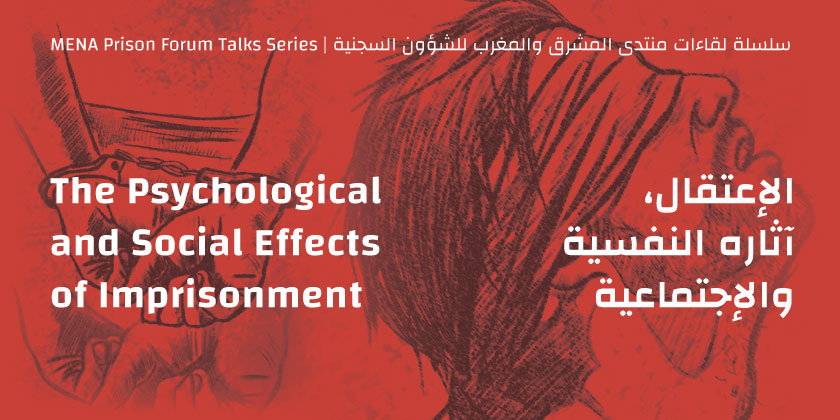
Artwork: Courtesy of Demuzi
THE PSYCHOLOGICAL & SOCIAL EFFECTS OF IMPRISONMENT
A Conversation with Syrian Experts | Part II
Via Zoom
JUN 1, 2023
On 1 June 2023 the MENA Prison Forum (MPF) hosted the second part of its series the “Psychological & Social Effects of Imprisonment” (See Part I here). A motivation behind this series of talks is to include the dynamics and impacts of the political violence inflicted by the Syrian government that are often overlooked by international projects. Therefore, the MPF sees talks such as these as vital complements to discussions and evidence collection prompted by other initiatives and efforts, such as the international criminal trials in Europe of members of the Assad regime.
The talk was introduced by MPF Coordinator Mina Ibrahim and moderated by long-term MPF partner Jaber Baker. The talk included interventions from Dr. Jalal Nofal, who is an ex-prisoner and psychiatrist who has worked for five years on psychosocial support programs for Iraqi refugees in Syria; Dr. Ammar A. Beetar: a psychiatrist who has worked across public and private spheres and currently works in humanitarian settings with a specific focus on rape and torture survivors; and Salah Addin Lakkeh, who works in mental health and psycho-social support and as a counselor for torture survivors, NGOs workers, and witnesses.
The talk, which was attended by around 80 people, had been previously scheduled for earlier in the year, but due to the devastating earthquake that struck Turkey and Syria in early 2023, the talk was postponed. Elements of the earthquake were repeatedly evoked through the talk for the psychological and social effects it had on Syrians in Syria and Turkey in comparison and similarity to those caused by the Syrian regime’s use of imprisonment. The discussants stated that the earthquake reactivated feelings and triggered emotions of loss and grief on a societal level, calling to attention the societal impact of trauma and loss in cases such as wide-scale natural disasters and wide-scale political violence. The earthquake therefore further highlighted a need for programs and interventions that address both loss experienced by individuals and by societies and communities.
Another similarity between the losses of the earthquake and that of the phenomena of mass imprisonment in Syria is the nature of individuals being “disappeared” without knowing what happened to them or without access to their bodies for burial. A large portion of the talk addressed this through a discussion of how rituals related to death can help individuals and societies heal. The ability to engage in social rituals that bring communities together around loss and have specific roles for those directly affected and those within the community to play has been shown to have positive healing effects on both in the aftermath of loss. Specific rituals such as the visiting of families after a death in the family, the ability of the family to explain and answer questions about the death of a loved one, and the physical presence through touches of support and touching of items belonging to the deceased were all explored for their healing benefits. However, these rituals are disrupted when families and societies do not know how to mourn or grieve losses that are unknown or large-scale in nature.
The issue of mourning loss on an individual and societal level when there is a large proportion of displacement and migration was also explored in terms of how these death rituals can be enacted from a distance and virtually in these cases. The ability to mourn far from the affected community and through social media was outlined as a difficulty, as was the inability to physically be present at the burials of the dead, either due to an inability to have the body in the case of death in imprisonment and in the earthquakes, or during the COVID-19 pandemic. The lack of knowledge of and access to the body have been seen to cause cases of extended grief and long-term individual and societal impacts on people in Syria. The talk addressed how the ability to access and engage with the bodies of the deceased as part of mourning and healing rituals is a basic right that should be guaranteed to all families and is an element of achieving justice in the right to know for these families.
Another topic addressed was the linguistic terms and synonyms for loss, grief, and sadness, and how there can be different stages of these emotions as well as conflicted feelings around them. Elements of Arab cultural and societal expectations and practices were also addressed around grief, including the customary three-day morning period and the practice of visiting the graves of loved ones on holidays.
A possible area for strengthening psycho-social support around these types of deaths and losses was mentioned in the form of support groups among individuals who lost family members in similar ways, such as mothers who have lost their sons in prison. Examples of communities formed around loved ones lost in specific events were given as sources of support and healing for those suffering. In a similar vein, during the Q&A session, participants asked if the MPF could organize similar events that focus on other countries in the region and that consider the multiple cultural and religious backgrounds of the survivors of detention and torture, which the MPF is currently exploring.
Dr. Jalal Nofal is an ex-prisoner, psychiatrist, psychosocial support trainer in crisis, MHGAP Trainer in Primary Care. He worked for five years on psychosocial support programs for Iraqi refugees in Syria.
Dr. Ammar A. Beetar worked as a psychiatrist in public, private and currently still working in humanitarian settings. His work experience includes special focus on rape and torture survivors.
Salah Addin Lakkeh has a Bachelor of Psychology and is a trainer and supervisor in mental health and psychosocial support. He also works in MHPSS research and as a counsellor for torture survivors, NGOs workers and witnesses.